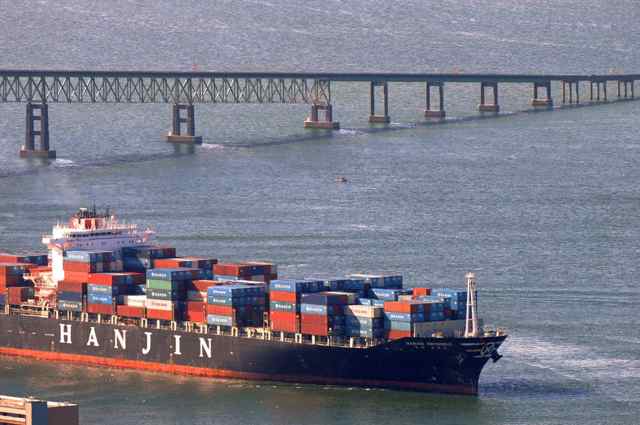forum
library
tutorial
contact

Federal Judge Orders Longshore Union to Pay $60,000
for Violating Court Order in 2012 Slowdown Case
by Molly Harbarger
The Oregonian, March 10, 2015
|
the film forum library tutorial contact |

|
Federal Judge Orders Longshore Union to Pay $60,000
by Molly Harbarger
|
 A federal judge on Monday ordered the national longshoremen union and its Portland chapter to pay nearly $60,000 to the National Labor Relations Board for violating a court order to resume normal operations at the Port of Portland's Terminal 6.
A federal judge on Monday ordered the national longshoremen union and its Portland chapter to pay nearly $60,000 to the National Labor Relations Board for violating a court order to resume normal operations at the Port of Portland's Terminal 6.
U.S. District Judge Michael Simon ruled in December 2014 that the International Longshore and Warehouse Union continued to slow down work at Portland's container-shipping terminal for more than a year, even after being ordered by the court to stop the slowdown in 2012.
That ruling stipulated that the union -- both Local 8 and the San Francisco-based headquarters -- is on the hook to pay for the National Labor Relations Board's attorneys fees.
On Monday, Simon approved $59,628.18 in fees.
Elvis Ganda, chief executive of terminal operator ICTSI Oregon, sees the judgment as a win -- showing the union there is a cost to its actions.
The longshore union, though accepting of the order -- it didn't contest the labor board's fee estimate -- maintains it wasn't't at fault throughout the proceedings.
"It's standard procedure when the board prevails in court to pay market rate attorney fees for their time," union spokeswoman Jennifer Sargent said. "The money reimbursed to the board is based on market rates and is far above their actual expenses - so the board and government actually profit from workers by pursuing litigation against their unions."
The order is the final step in a case that started in 2012. ICTSI Oregon claimed that dock workers were slowing down loading and unloading containers at the port to punish the port operator for not giving the union two jobs plugging, unplugging and monitoring refrigerated shipping containers.
But while this case is closed, the relationship between ICTSI Oregon and the longshoremen continues to deteriorate.
The port just lost nearly 80 percent of the container terminal's business when Hanjin Shipping announced it would stop calling in Portland, largely because service on the docks was unreliable and slow.
The union and port operator continue to blame each other for the problems, while people who rely on importing and exporting call for some kind of intervention or resolution.
For a while, the port was hit doubly hard by a West Coast-wide backlog of ships waiting to be unloaded while the union and the port operators association, the Pacific Maritime Association, negotiated a new contract. Now that the contract talks are over, Portland stands alone as a problem child among the 29 West Coast ports, which are working to clear the backlog.
Related Pages:
Port of Portland, Longshore Union Still Trading Blame, Barbs as Rest of West Goes Back to Work by Molly Harbarger, The Oregonian, 2/24/15
learn more on topics covered in the film
see the video
read the script
learn the songs
discussion forum
